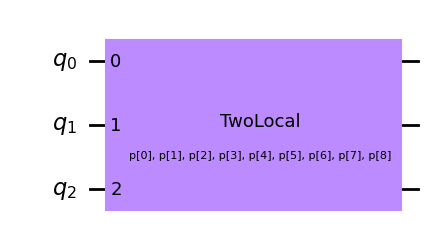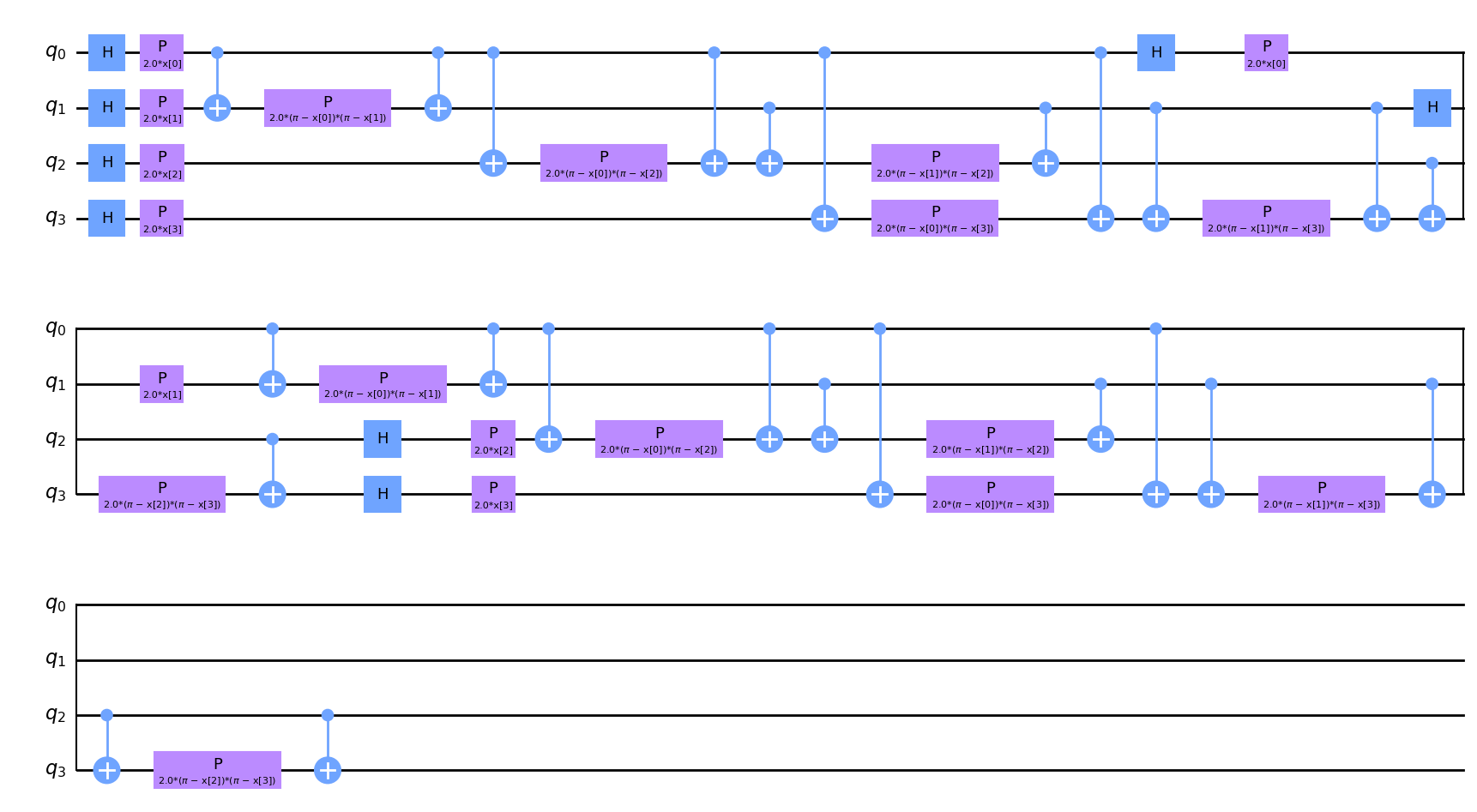squlearn.encoding_circuit.QiskitEncodingCircuit
- class squlearn.encoding_circuit.QiskitEncodingCircuit(qiskit_circuit: BlueprintCircuit | Callable | QuantumCircuit, mode: str = 'auto', decompose: bool = False, feature_label: str = 'x', parameter_label: str = 'θp', **kwargs)
Wrapper to create sQUlearn encoding circuits from the Qiskit circuit library.
Example: create a encoding circuit from Qiskit TwoLocal map
from squlearn.encoding_circuit import QiskitEncodingCircuit from qiskit.circuit.library import TwoLocal local = TwoLocal(3, 'ry', 'cx', 'linear', reps=2, insert_barriers=True) QiskitEncodingCircuit(local).draw("mpl")

An alternative call can be made by passing the circuit library function and its arguments:
from squlearn.encoding_circuit import QiskitEncodingCircuit from qiskit.circuit.library import ZZFeatureMap QiskitEncodingCircuit(ZZFeatureMap,feature_dimension=4).draw("mpl")

- Parameters:
qiskit_circuit (Union[BlueprintCircuit, Callable,QuantumCircuit]) – A Qiskit circuit or a Qiskit circuit library function
mode (str) – Option for considering the circuit parameters as features or trainable parameters. Can be
featuresorparametersorauto. With auto, the mode is automatically determined depending on the parameter name. (default:auto)decompose (bool) – If True, the decompose method is called on the inputted circuit object. (default:
True)feature_label (str) – The label of the parameters that are considered as features. (default:
x)parameter_label (str) – The label of the parameters that are considered as trainable parameters. (default:
θp)**kwargs – Arguments for the Qiskit circuit library function if it is passed as a callable
- compose(x, concatenate_features=False, concatenate_parameters=False, num_circuit_features: Tuple[int, int] = (None, None))
Composition of encoding circuits with options for handling features and parameters
Number of qubits and features have to be equal in both encoding circuits! The special function and properties of the both encoding circuits are lost by this composition.
- Parameters:
self (EncodingCircuitBase) – right / first encoding circuit
x (EncodingCircuitBase) – left / second encoding circuit
concatenate_features (bool) – If True, the features of both encoding circuits are concatenated (default: False). If False, the features of both encoding circuits are taken
concatenate_parameters (bool) – If True, the parameters of both encoding circuits are concatenated (default: False). If False, the parameters of both encoding circuits are taken
num_circuit_features (Tuple[int, int]) – Tuple of the number of features for both encoding circuits. This has to be provided if concatenate_features is True otherwise an error is raised.
- Returns:
Returns the composed encoding circuit as special class ComposedEncodingCircuit
- draw(output: str = None, num_features: int = None, feature_label: str = 'x', parameter_label: str = 'p', decompose: bool = False, **kwargs) None
Draws the encoding circuit using the QuantumCircuit.draw() function.
- Parameters:
output (str) – Output format of the drawing (default: None).
num_features (int) – Number of features to draw the circuit with (default: None).
feature_label (str) – Label for the feature vector (default:”x”).
parameter_label (str) – Label for the parameter vector (default:”p”).
decompose (bool) – If True, the circuit is decomposed before printing (default: False).
kwargs – Additional arguments from Qiskit’s QuantumCircuit.draw() function.
- Raises:
ValueError – Raised if the number of features is not provided.
- Returns:
Returns the circuit in qiskit QuantumCircuit.draw() format
- generate_initial_parameters(num_features: int, seed: int | None = None) ndarray
Generates random parameters for the encoding circuit
- Parameters:
num_features (int) – Number of features of the input data
seed (Union[int,None]) – Seed for the random number generator (default: None)
- Returns:
The randomly generated parameters
- get_circuit(features: ParameterVector | ndarray, parameters: ParameterVector | ndarray) QuantumCircuit
Returns the circuit of the Qiskit Encoding Circuit
- Parameters:
features (Union[ParameterVector,np.ndarray]) – Input vector of the features from which the gate inputs are obtained.
parameters (Union[ParameterVector,np.ndarray]) – Input vector of the parameters from which the gate inputs are obtained.
- Returns:
The circuit of the Qiskit Encoding Circuit with the assigned parameters.
- get_feature_bounds(num_features: int) ndarray
Returns the feature bounds expanded for a given number of features.
- Parameters:
num_features (int) – Number of features to expand the bounds for.
- Returns:
Feature bounds expanded for the number of features.
- Return type:
np.ndarray
- get_params(deep: bool = True) dict
Returns hyper-parameters and their values of the Qiskit encoding circuit
No hyper-parameters are available for the Qiskit encoding circuit!
- Parameters:
deep (bool) – If True, also the parameters for contained objects are returned (default=True).
- Returns:
Dictionary with hyper-parameters and values.
- inverse()
Returns the inverse of the encoding circuit.
- Returns:
The inverse of the encoding circuit
- set_params(**params) EncodingCircuitBase
Sets value of the encoding circuit hyper-parameters.
- Parameters:
params – Hyper-parameters and their values, e.g.
num_qubits=2.